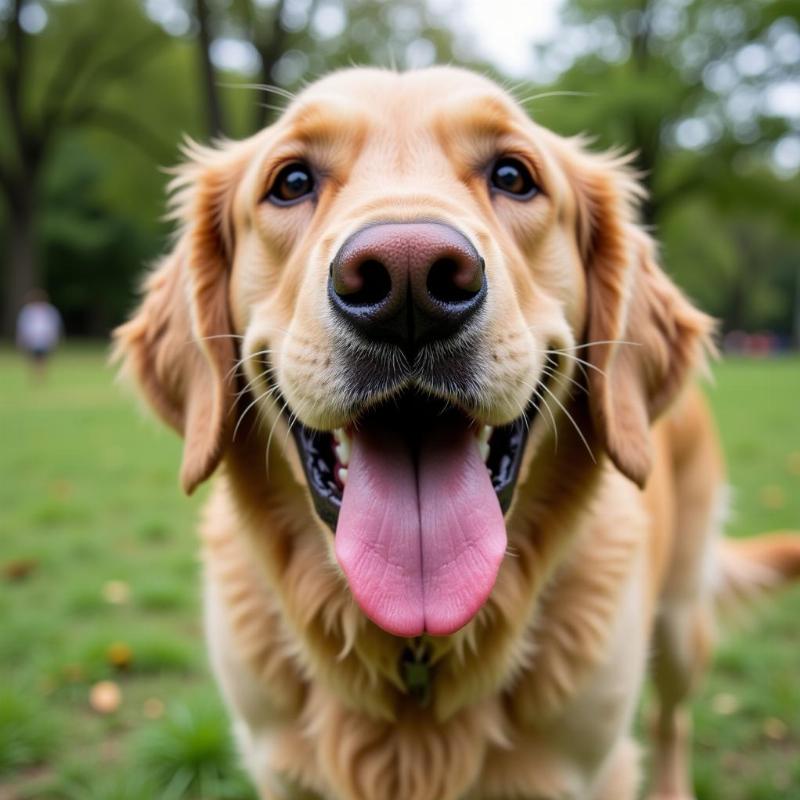Rapid breathing in dogs, also known as tachypnea, can be concerning for any pet owner. While some panting is normal, especially after exercise or in hot weather, excessive or rapid breathing can signal an underlying health issue. Understanding the potential causes of tachypnea can help you determine when your furry friend needs immediate veterinary attention.
 Chó thở nhanh sau khi tập thể dục
Chó thở nhanh sau khi tập thể dục
Common Reasons for Rapid Breathing in Dogs
Several factors can contribute to a dog breathing fast. Some are relatively benign, while others can be serious. Here’s a breakdown of the most common causes:
- Heat and Exercise: After physical exertion or on a hot day, dogs pant to regulate their body temperature. This is a normal physiological response. Providing shade, cool water, and limiting strenuous activity during hot weather is crucial.
- Anxiety and Stress: Just like humans, dogs experience anxiety and stress. A trip to the vet, loud noises like fireworks, or changes in their routine can trigger rapid breathing. Creating a calm and comforting environment can help alleviate their stress.
- Pain: If your dog is experiencing pain from an injury or illness, they may breathe rapidly. Observe for other signs of discomfort like whining, limping, or changes in behavior. If you suspect your dog is in pain, seek veterinary care promptly.
- Respiratory Infections: Conditions like pneumonia, kennel cough, and bronchitis can cause inflammation in the airways, leading to rapid breathing, coughing, and nasal discharge.
- Heart Conditions: Heart disease can make it difficult for the heart to pump blood efficiently, resulting in fluid buildup in the lungs. This can lead to rapid, shallow breathing, exercise intolerance, and coughing.
- Anemia: A low red blood cell count reduces the amount of oxygen carried throughout the body, forcing the dog to breathe faster to compensate. Anemia can be caused by various factors, including blood loss, parasites, and certain diseases.
When to Seek Veterinary Care
While some panting is normal, it’s essential to recognize when rapid breathing warrants a trip to the veterinarian. Seek immediate veterinary attention if your dog’s rapid breathing is accompanied by any of the following:
- Pale or blue gums: This can indicate a lack of oxygen.
- Weakness or lethargy: These are signs of a potentially serious underlying condition.
- Difficulty breathing or noisy breathing: These can be signs of respiratory distress.
- Collapse or fainting: These are emergency situations requiring immediate intervention.
- Excessive drooling or foaming at the mouth: This could suggest poisoning or a neurological issue.
Understanding Your Dog’s Breathing Patterns
“Observing your dog’s normal breathing rate can help you recognize changes and act quickly when necessary,” says Dr. Emily Carter, DVM, a veterinary specialist in internal medicine. “Knowing what’s normal for your dog is crucial for early detection of potential problems.”
Conclusion
Rapid breathing in dogs can be a symptom of various conditions, ranging from benign to life-threatening. Understanding the potential causes and recognizing warning signs can help you determine when to seek veterinary care. Regular check-ups and open communication with your veterinarian are key to ensuring your furry friend’s health and well-being. Monitoring your dog’s breathing and seeking prompt veterinary attention when necessary can make all the difference.
FAQ
- What is considered a normal breathing rate for a dog? A normal resting respiratory rate for dogs is typically between 10-30 breaths per minute.
- Is panting always a sign of a problem? No, panting is a normal way for dogs to cool down, especially after exercise or in hot weather. However, excessive or rapid panting can be a cause for concern.
- What should I do if my dog is breathing fast and seems distressed? Seek immediate veterinary care.
- Can stress cause rapid breathing in dogs? Yes, anxiety and stress can trigger rapid breathing in dogs.
- How can I help my dog if they are breathing fast due to heat? Provide them with shade, cool water, and avoid strenuous activity during hot weather.
- What are the signs of respiratory distress in dogs? Difficulty breathing, noisy breathing, pale or blue gums, weakness, and collapse are all signs of respiratory distress.
- Should I be concerned if my dog’s breathing is fast after exercise? Some panting after exercise is normal. However, if the rapid breathing persists for an extended period or is accompanied by other symptoms, consult your veterinarian.
About Beautdogs.us
Beautdogs.us is your premier resource for all things dog-related in the US. We offer expert advice on dog breeds, grooming, nutrition, training, and overall wellness. Whether you’re a seasoned dog owner or just starting your journey with a furry friend, Beautdogs.us provides reliable, comprehensive, and engaging content to help you navigate the joys and challenges of dog ownership. Contact us today for more information: Email: [email protected], Phone: +1 501-555-7529.